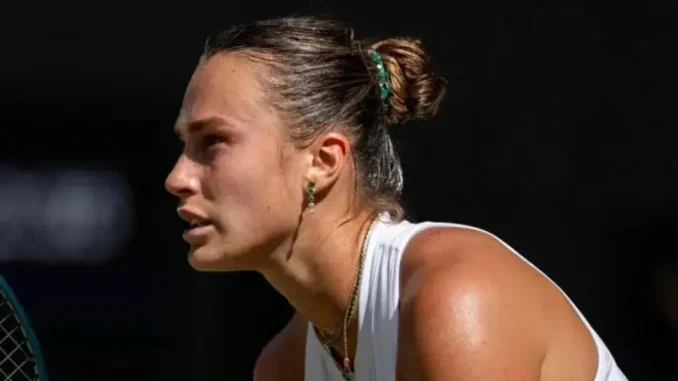
Aryna Sabalenka, the world’s top-ranked women’s tennis player, has always been a force of nature on the court, her powerful serves and relentless baseline game striking fear into opponents. Yet, after a heart-wrenching semifinal loss at Wimbledon 2025 to Amanda Anisimova, the Belarusian star made a bold decision that surprised many: she chose to step away from the court. Opting to skip the Canadian Open in Montreal, Sabalenka decided to take a much-needed break to recharge mentally and physically before returning at the Cincinnati WTA 1000, a key preparatory event for the US Open. This strategic pause, as she explained, was not just about recovery but about ensuring she could bring her best to the season’s final Grand Slam in New York.
The 27-year-old’s 2025 season has been a rollercoaster of triumphs and near-misses. With a commanding 47-9 record and three titles, including a WTA 1000 victory in Cincinnati, Sabalenka has solidified her position as the WTA’s No. 1 player, a ranking she’s held for 40 consecutive weeks. Her consistency in Grand Slams is unmatched, boasting a 17-3 record across the year’s majors. Yet, the sting of falling short in three major finals—losing to Madison Keys in Australia, Coco Gauff at Roland Garros, and Anisimova at Wimbledon—has fueled her determination. “I realized that I needed a break after Wimbledon, and I feel like I made the right choice,” Sabalenka said in a press conference ahead of the Cincinnati Open, her voice reflecting a mix of resolve and relief. “I was in my bikini and flip flops,” she added with a laugh, painting a vivid picture of her time unwinding on a beach, far from the pressures of the tour.
Sabalenka’s decision to step back was not taken lightly. Wimbledon, a tournament where she’s reached the semifinals three times but never the final, has been a source of frustration. “I have really more of a hate relationship right now with Wimbledon,” she admitted after her 6-4, 4-6, 6-4 defeat to Anisimova, a match marked by intense rallies and critical errors, including a costly double fault and a wayward forehand that handed her opponent the edge. The emotional toll of the loss was palpable. “Losing sucks, you know? You always feel like you want to die, you don’t want to exist anymore,” she confessed, revealing the raw vulnerability of a champion navigating the highs and lows of professional tennis. Her choice to pause was a lesson learned from past mistakes, particularly after her controversial post-match comments following the French Open final, where she criticized Gauff’s win. Determined to avoid another media storm, Sabalenka took time to compose herself at Wimbledon, joking with reporters, “You’re not going to see the Roland Garros press conference, so anyone who was waiting for that can leave right now!”
The break proved transformative. Returning to her Miami home, Sabalenka focused on mental and physical rejuvenation, a stark contrast to her younger self who might have pushed through pain. “At the end, it was very important for me to take a little break. I had really tough struggles starting from March,” she reflected, alluding to a shoulder injury that forced her withdrawal from Wimbledon 2024 and lingered into the early season. By skipping Montreal, she avoided the grueling surface changes that had taxed her body—grass to clay for the Olympics, then back to hard courts. Instead, she prioritized recovery, emerging “more fresh and more ready to go” for Cincinnati, where she faces a challenging draw, potentially meeting Emma Raducanu in the third round.
Sabalenka’s hiatus wasn’t just about healing her body; it was about rediscovering joy. Her candid vlog posts captured her grappling with defeat, lamenting, “I am such a loser. I hate myself,” while packing her bags post-Wimbledon. Yet, those moments of vulnerability gave way to optimism. “I think it’s important to go and have fun and enjoy life,” she said, acknowledging the emotional tightrope athletes walk. Her time off allowed her to reset, returning with a hunger to claim her fourth Grand Slam title at the US Open, where she triumphed in 2023. With her game clicking—evidenced by her Cincinnati title and a newfound mental clarity—Sabalenka is poised to turn her “hate relationship” with Wimbledon into a distant memory and cement her legacy as one of tennis’s brightest stars.
Leave a Reply